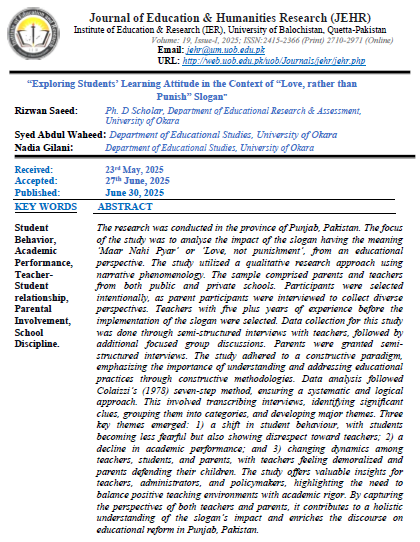Exploring Students’ Learning Attitude in the Context of “Love, rather than Punish” Slogan
Keywords:
Student Behavior, Academic Performance, Teacher-Student relationship, Parental Involvement, School Discipline.Abstract
The research was conducted in the province of Punjab, Pakistan. The focus of the study was to analyze the impact of the slogan having the meaning ‘Maar Nahi Pyar’ or ‘Love, not punishment’, from an educational perspective. The study utilized a qualitative research approach using narrative phenomenology. The sample comprised parents and teachers from both public and private schools. Participants were selected intentionally, as parent participants were interviewed to collect diverse perspectives. Teachers with five plus years of experience before the implementation of the slogan were selected. Data collection for this study was done through semi-structured interviews with teachers, followed by additional focused group discussions. Parents were granted semi-structured interviews. The study adhered to a constructive paradigm, emphasizing the importance of understanding and addressing educational practices through constructive methodologies. Data analysis followed Colaizzi’s (1978) seven-step method, ensuring a systematic and logical approach. This involved transcribing interviews, identifying significant clues, grouping them into categories, and developing major themes. Three key themes emerged: 1) a shift in student behavior, with students becoming less fearful but also showing disrespect toward teachers; 2) a decline in academic performance; and 3) changing dynamics among teachers, students, and parents, with teachers feeling demoralized and parents defending their children. The study offers valuable insights for teachers, administrators, and policymakers, highlighting the need to balance positive teaching environments with academic rigor. By capturing the perspectives of both teachers and parents, it contributes to a holistic understanding of the slogan’s impact and enriches the discourse on educational reform in Punjab, Pakistan.
References
Dreber, A., Rand, D. G., Fudenberg, D., & Nowak, M. A. (2008). Winners don’t punish. Nature, 452(7185), 348-351.
Errasti‐Ibarrondo, B., Jordán, J. A., Díez‐Del‐Corral, M. P., & Arantzamendi, M. (2018). Conducting phenomenological research: Rationalizing the methods and rigour of the phenomenology of practice. Journal of advanced nursing, 74(7), 1723-1734.
Khalid., Batool, U., & Hussain, B. (2020). Perceptions of teachers regarding corporal punishment and its effects on students’ achievement at primary school level. Journal of Elementary Education, 30(1), 27-38.
Naz, A., Khan, W., Daraz, U., Hussain, M., & Khan, Q. (2011). The impacts of corporal punishment on students’ academic performance/career and personality development up-to secondary level education in Khyber Pakhtunkhwa Pakistan. International Journal of Business and Social Science, 2(12).
Rafique, N., Naoreen, B., & Ayub, M. (2019). Prevalence of Physical Abuse at Primary School Level in District Faisalabad.
Siddiqui, M. F., Arif, M., & Muhammad, Y. (2020). Maintaining discipline in private primary schools in the wake of ban on corporal punishment: A qualitative case study of teachers’ perspectives. Kashmir Journal of Education, 1(2), 52-76.
Siddiqui, M. F., Muhammad, Y., & Naseer, H. (2021). Principals’ self-efficacy beliefs about managing bullying cases in secondary schools. sjesr, 4(1), 338-349.
Witterholt, M., Goedhart, M., Suhre, C., & van Streun, A. (2012). The interconnected model of professional growth as a means to assess the development of a mathematics teacher. Teaching and Teacher education, 28(5), 661-674.




